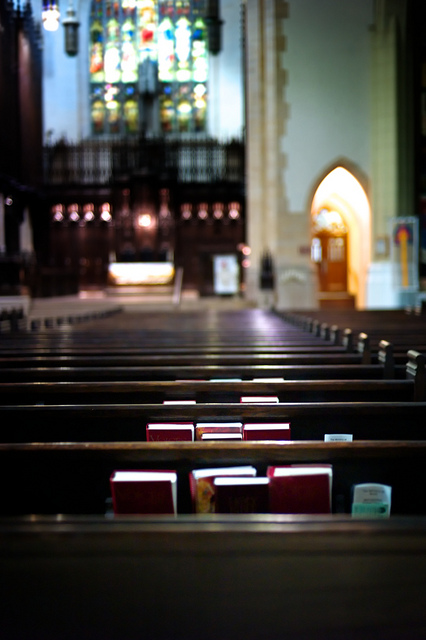Please support our coverage of democratic movements and become a monthly supporter of rabble.ca.
It turns out that even God’s work is precarious work, which is why United Church priests are organizing to join unions.
In his office at Glen Rhodes United Church in East Toronto, Reverend Minister Robin Wardlaw explains why a nation-wide group of United Church of Canada Ministers are seeking unionization under Unifor’s new, experimental community chapters program.
“Lots of ministers have been saying for ages that there should be some organization for us,” said Wardlaw. “We don’t have any chance as United Church ministers to get together for our own interests.”
Community chapters, announced as one of Unifor’s cornerstone organizing programs, were introduced at their founding convention last September. The chapters are the union’s attempt to reach many precariously employed workers, who may not ever have contact with a union otherwise.
“The reality is: because precarious work is on the rise, a lot of people are working contract positions and those are positions that are not certifiable or organizable in the traditional sense,” said Roxanne Dubois, a Unifor staff member who leads the community chapter initiative.
Community chapters act as an organizing mechanism for workers who cannot join a union in a traditional manner. For example, one of the other chapters is for freelance workers, who can’t yet pursue a collective agreement because they are considered independent contractors.
The United Church of Canada ministers — who call their chapter Unifaith — also present a unique legal challenge. While a minister spiritually leads their congregation, the congregation’s donations fund the minister’s wages. The duties typically affiliated with an employer are also split between the congregation and the United Church of Canada. This begs the question — who is the employer?
That said, the need for a union is pressing for the ministers. Though Wardlaw described the compensation package as very fair, many ministers face a reduction in hours — sometimes down to half or quarter time from full time — as the size of the congregations shrink. This unique management system presents another challenge as well – it’s also hard to find a place to go to deal with workplace harassment.
While the eventual goal is to form a bargaining unit, the community chapter allows the ministers to connect with each other and discuss these problems, as well as giving them access to some of the benefits that come with unionization.
Unifor offers members the chance to pay into a benefits plan and gives them access to banking services, should the group not want to open its own bank account quite yet.
The dues are lower than they would be in a traditional bargaining unit – $5 a month for unemployed people, $10 for employed. Dubois explained that 100 per cent of the dues go back into the chapter, so they get the benefit of the added resources.
While much of this sounds good on paper, Unifor is still working out the kinks of this new organizing model.
“Community chapters are an experiment,” said Dubois. “It is new and is pushing the boundaries of what both unions — CEP and CAW — have done before in terms of organizing.” For that reason, the model is constantly evolving. “It’s changing everyday,” Dubois said. “Every time I get a phone call. There is no formula yet.”
Wardlaw’s assessment of the community chapters is positive.
“Unifor has been great,” he said. “They really care about workers in Canada. They are aware that many people will never get a certified union.”
And what does his congregation think of him and the other United Church of Canada ministers joining a union?
“They hosted the inaugural meeting back in January,” Wardlaw said. “It was very sweet.”
Check out part one, part two and part three of H.G. Watson’s four-part special feature on precarious work.
Photo: flickr/Matt Jiggins



